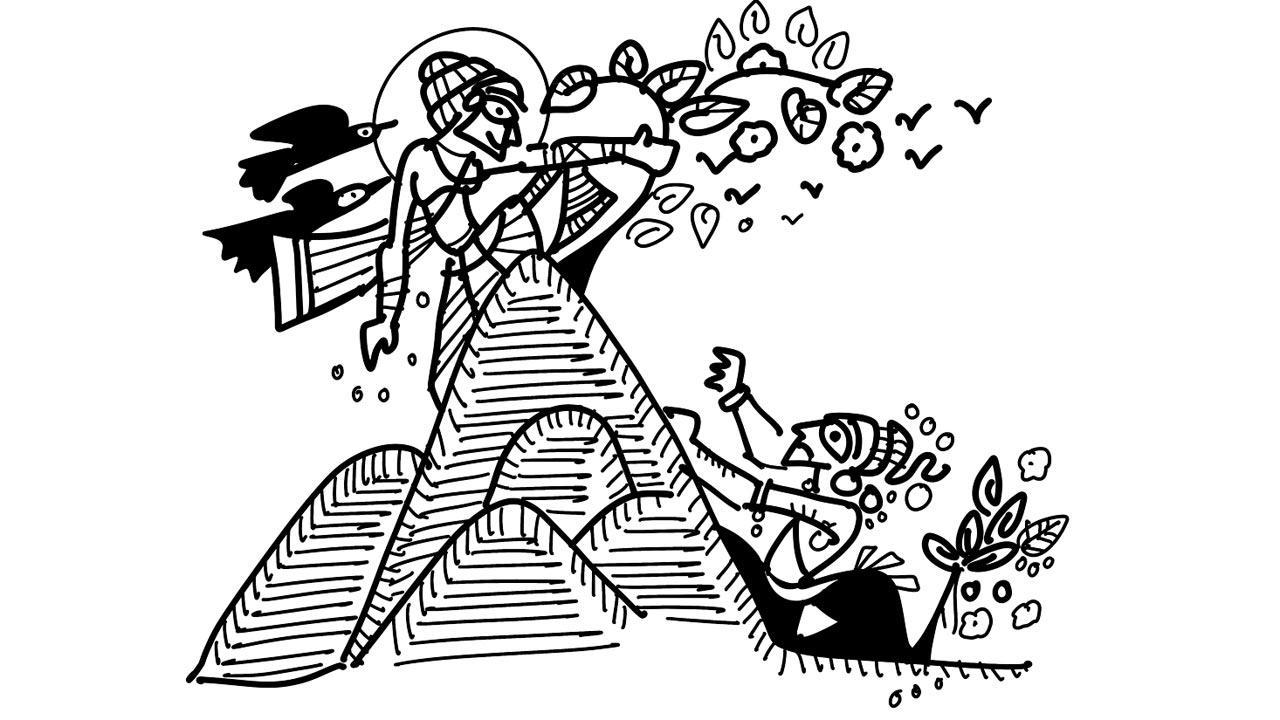They tried climbing back into Swarga, but Indra and the devas would not allow them to come back. Thus began the battle of the devas and the asuras in Buddhist myths

Illustration/Devdutt Pattanaik
 Swarga or paradise of the gods, full of wish-fulfilling trees, damsels and musicians, is described in Buddhist and Jain mythologies, not just Hindu mythology.
Swarga or paradise of the gods, full of wish-fulfilling trees, damsels and musicians, is described in Buddhist and Jain mythologies, not just Hindu mythology.
When Buddha attains nirvana, he first travels to the heaven of 33 gods where he meets his mother (reborn as a god) and then comes down to earth. Many artworks display this episode of Buddha descending from the realm of 33 gods. These are the 33 gods we learn about in Vedic literature. Their leader is called Indra or Sakra. This is his story as per Buddhist lore.
Once upon a time, there was a noble, generous and kind king, called Maga. He became so great that he was invited to be the Indra, or king of Swarga. When he reached the heavenly realms, he did not want to share his newfound kingdom with the asuras. Thus, he intoxicated them and cast them out from Swarga, down the slopes of the Meru hill, when they were in a drunken state. The asuras led by Puloman realised that they were no longer in heaven, when they saw that the trees around them were not the wish-fulfilling trees of Swarga. They tried climbing back into Swarga, but Indra and the devas would not allow them to come back. Thus began the battle of the devas and the asuras in Buddhist myths.
Once, when the devas and asuras were fighting, Indra got scared of the asuras. He turned around and rode away from the battlefield. But then he realised his chariot was on a path that would destroy a tree and kill birds who nested on its branches. So to protect them, he turned the chariot around. On seeing Indra turn around again, the asuras got scared and fled the battle. Thus, through the desire to not hurt innocent creatures, Indra was able to win the war against the asuras.
In another story, Mandhata is so great a king that he is invited by his neighbours to rule their land. Even Indra invites him to rule half of Swarga. Once there Mandhata experiences greed and wonders why he’s only allowed to rule half of heaven and not the whole of it. This upsets Indra and Indra casts him out of Swarga, and he falls on earth as a reptile.
In Jain literature, we are told that Rishabha, the great king, was invited to Sarga to enjoy a dance recital. He noticed that midway through her performance, the apsara Nilanjana died, but Indra used his magical powers to replace her with another similar looking apsara. Despite death, life went on as usual in Swarga. Realising death is a reality that even the gods cannot escape, Rishabha decided to renounce the world. He discovered the Jain path and became the first Tirthankara of the current era, who resides in a higher heaven called Siddha-loka.
While in Vedic literature, Swarga is the highest heaven, by the time of the Mahabharata, it is seen as a lesser heaven, a material paradise, where there is no spiritual peace, unlike Shiva’s Kailasa and Vishnu’s Vaikuntha. Indra’s exalted station became lower than that of the Buddha, the Tirthankara, and in Hindu myths—he is below Shiva and Vishnu. It is now reduced to the realm of the privileged, who do not share what they have, unless they get something in exchange. Sounds familiar?
The author writes and lectures on the relevance of mythology in modern times. Reach him at devdutt.pattanaik@mid-day.com
 Subscribe today by clicking the link and stay updated with the latest news!" Click here!
Subscribe today by clicking the link and stay updated with the latest news!" Click here!










